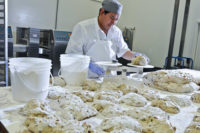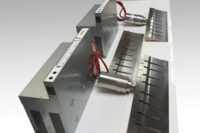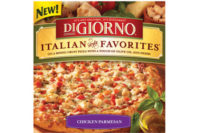Bakers and snack makers are well-acquainted with the saying, “Time is money.” A malfunctioning oven, depositor or conveyor system can result in production delays that negatively impact customers, as well as the bottom line.
A systematic maintenance program can help food manufacturers reduce incidences of equipment failure and address industry-specific issues such as sanitation and demanding production schedules. Using lubricants designed specifically for food-processing machinery is crucial, too, to prevent problems associated with the type of high-volume, high-temperature production that bakers and snack producers do.
“Food manufacturing facilities are different animals than industrial, construction or nonfood manufacturing facilities,” says Scott Thomann, manager, eastern region, for JAX Inc., Menomonee Falls, Wis. “Knowing the applications, regulations and lubrication needs within these facilities can help reduce downtime and any current frustrations with equipment and lubricant life.”
The manufacturer and supplier of food-grade lubricants for machinery and processes added another lubricant—JAX Pyro-Kote FG—to its product line last summer. The high-temperature, synthetic oven chain lubricant is designed for tray- and tunnel-style chain-driven ovens, as well as tortilla ovens.
Meeting food safety requirements
According to Thomann, JAX Pyro-Kote FG has been approved by the National Sanitation Foundation and the U.S. Department of Agriculture (USDA) for incidental food contact (NSF/USDA H1), allowing “bakers to meet today’s higher food-safety requirements with superior lubricating capabilities at the higher temps that conventional baking equipment is exposed to,” he says.
Newark, N.J.-based Lubriplate Lubricants Co., meanwhile, has unveiled two lubricants: Lubriplate HTCL-FG 68; and HTCL-FG 220. The 100% ester-based, food-grade synthetic fluids also are designed to lubricate high-temperature oven chains, including bakery oven chains, and NSF H1-approved.
“Lubriplate polyol ester fluids deliver maximum oxidation stability, which yields less oil use, less carbon buildup on the chain and less [volatile organic compounds] in the facility,” says vice president and chief marketing officer Jim Girard. “They are better for the workforce, better for the lubrication environment and ultimately better for the consumer.”
Another recent addition to the industrial lubricants market comes from Petrochem Inc., St. Charles, Ill. Petro-Gard FG-220, a high-temperature, synthetic oven chain lubricant, is designed for use in a variety of ovens—tortilla, pita, tunnel/tray, rack, ovens, continuous conveyor and bagel/muffin—as well as in all food-processing equipment.
According to vice president Jill Dohner, the product is NSF H1-registered and complies with the Food and Drug Administration’s new Food Safety Modernization Act (FSMA) by preventing food contamination and allowing bakeries to achieve food safety.
The environmentally-friendly, synthetic ester blend also protects machinery against corrosion, rust, wear and friction.
Multi-use lubricants
Like ovens, other baking equipment operating at high temperatures requires specially formulated lubricants and frequent lubrication to function properly and efficiently. But other baking and snack machinery also needs regular maintenance to remain in good working order.
Clarion Lubricants’ PM High-Temp Food Machinery 100 greases, introduced last year, are blended for food-processing equipment with plain and rolling-element bearings and work in automatic and centralized lubrication systems. In addition to withstanding high-temperature conditions, the two greases are water-resistant, possess good adhesion properties, inhibit oxidation and offer excellent rust protection, according to the Houston-based company. They also comply with FDA regulation 21 CFR 178.3570, and are suitable for incidental food contact.
JAX Mold Release N-S, on the other hand, is designed for conveyors and belts used in applications such as candy making and molding formed protein products. Introduced by JAX in June 2011, the product is made with nonallergenic and nonGMO ingredients approved by the FDA as generally recognized as safe (GRAS), including a highly refined, nonsoy lecithin. “Soy is an allergen and must be listed as such on the label,” Thomann explains. “Our product eliminates any allergy concerns and listing on the label.”
Selection factors
The constant introduction of lubricants formulated for specific food-processing equipment and applications makes it easier for bakers and snack manufacturers to properly maintain their machinery. However, lubricant companies say there are some factors these equipment users should take into consideration when choosing lubricants.
“Where the lubricant will be used in the plant is extremely important,” says Benjamin Briseno, product manager for Clarion and industrial lubricants at Citgo Petroleum Corp. “The FDA has specific requirements where direct-contact, food-grade lubricants can be used versus where incidental-contact, food-grade lubricants can be used.”
Bakers should consider using an NSF H1 lubricant for manufacturing processes during which the lubricant could come into contact with food, even though it may cost more. “A lot of times, people just focus on the price of the lubricant,” Dohner says. “They need to sit down with their salespeople to determine what kind of base fluid they’re getting and what the advantages are of using a semi-synthetic or synthetic lubricant.”
Girard also advises bakers and snack producers to get a letter of guarantee from their lubricant supplier to ensure that the product they’ve selected is, in fact, H1, or food-grade.
Thomann, meanwhile, says asset protection should be the driving force behind a facility’s lubrication program and selection.
“Many food-grade lubricant manufacturers have a narrow product offering and try to lubricate multiple types of equipment with nonapplication specific lubricants,” he explains. “In the baking industry, we see an environment that has higher temps and humidity applications [and requires protection] against contaminants commonly found in a baking facility. Application-specific engineered lubricants help bakers protect their equipment in these environments and can usually capture a large cost savings, when the correct lubricant is specified.”
Bakers and snack producers are sure to benefit from all of the new food-grade lubricants entering the market, especially if they do their homework and select the one that meets all their equipment and application needs. It’s a small investment to make when choosing a product that can have a huge impact on their bottom line.








